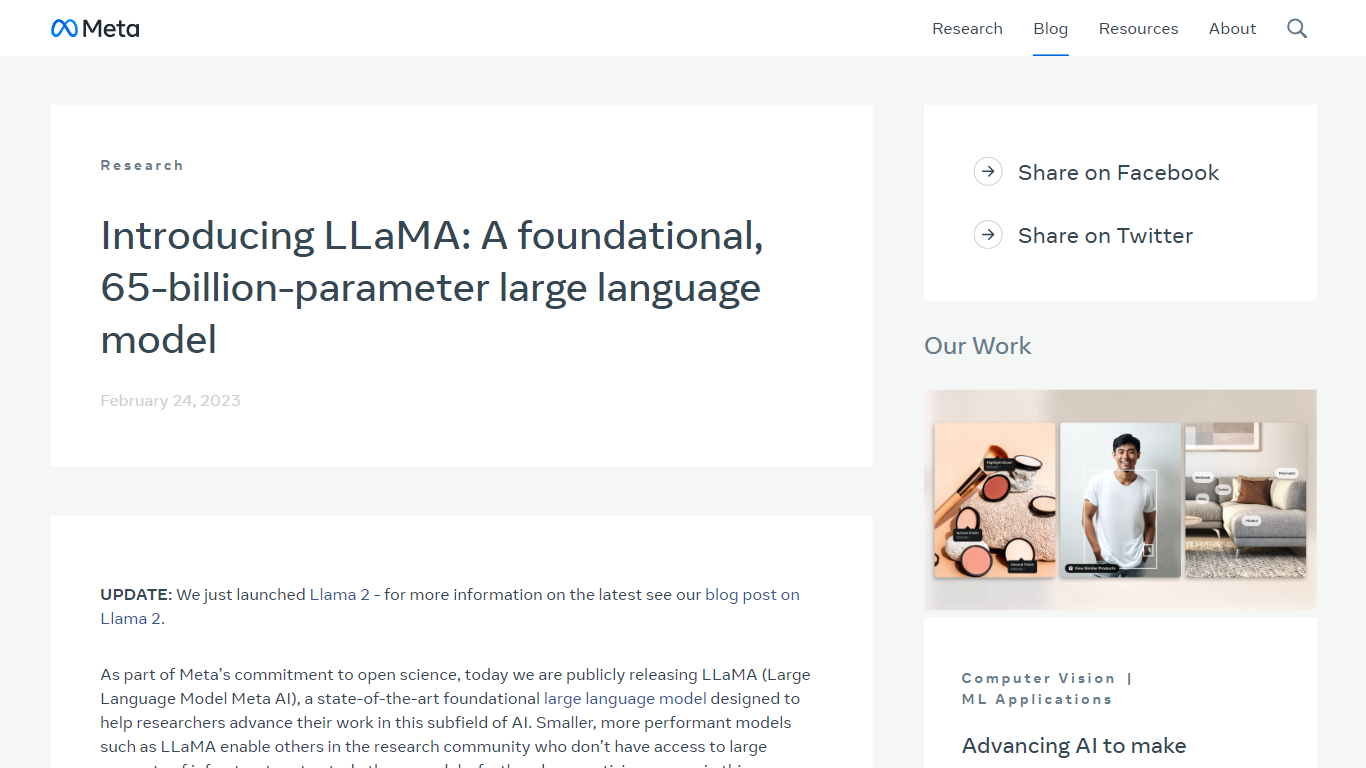LLaMA vs ggml.ai
In the face-off between LLaMA vs ggml.ai, which AI Large Language Model (LLM) tool takes the crown? We scrutinize features, alternatives, upvotes, reviews, pricing, and more.
In a face-off between LLaMA and ggml.ai, which one takes the crown?
If we were to analyze LLaMA and ggml.ai, both of which are AI-powered large language model (llm) tools, what would we find? Neither tool takes the lead, as they both have the same upvote count. Since other aitools.fyi users could decide the winner, the ball is in your court now to cast your vote and help us determine the winner.
Does the result make you go "hmm"? Cast your vote and turn that frown upside down!
LLaMA

What is LLaMA?
Meta AI introduces LLaMA, an innovative 65-billion-parameter foundational language model, breaking new ground in the realm of language processing. Designed with efficiency in mind, LLaMA stands out for its remarkable performance despite a lower demand for computing resources. This groundbreaking model is presented in multiple sizes, catering to various research needs and allowing for extensive fine-tuning and application across a multitude of tasks. The emphasis on responsible AI practices is commendable, ensuring that the model adheres to ethical standards while aiding research across the globe. LLaMA brings with it the promise of advancing AI technology while mitigating challenges such as bias and toxicity commonly encountered in large language models.
ggml.ai

What is ggml.ai?
ggml.ai is at the forefront of AI technology, bringing powerful machine learning capabilities directly to the edge with its innovative tensor library. Built for large model support and high performance on common hardware platforms, ggml.ai enables developers to implement advanced AI algorithms without the need for specialized equipment. The platform, written in the efficient C programming language, offers 16-bit float and integer quantization support, along with automatic differentiation and various built-in optimization algorithms like ADAM and L-BFGS. It boasts optimized performance for Apple Silicon and leverages AVX/AVX2 intrinsics on x86 architectures. Web-based applications can also exploit its capabilities via WebAssembly and WASM SIMD support. With its zero runtime memory allocations and absence of third-party dependencies, ggml.ai presents a minimal and efficient solution for on-device inference.
Projects like whisper.cpp and llama.cpp demonstrate the high-performance inference capabilities of ggml.ai, with whisper.cpp providing speech-to-text solutions and llama.cpp focusing on efficient inference of Meta's LLaMA large language model. Moreover, the company welcomes contributions to its codebase and supports an open-core development model through the MIT license. As ggml.ai continues to expand, it seeks talented full-time developers with a shared vision for on-device inference to join their team.
Designed to push the envelope of AI at the edge, ggml.ai is a testament to the spirit of play and innovation in the AI community.
LLaMA Upvotes
ggml.ai Upvotes
LLaMA Top Features
Efficient and Competitive: LLaMA is designed to be more efficient, requiring fewer computing resources, while maintaining competitive performance.
Variety of Sizes: The model is available in multiple sizes (7B, 13B, 33B, and 65B parameters), to suit different research needs.
Inclusive Access: Aiming to democratize AI, LLaMA is made accessible to a wider research community, including those with limited resources.
Responsible AI Practices: Meta AI incorporates principles of Responsible AI in LLaMA's development to address ethical concerns such as bias and toxicity.
Multilingual Training: LLaMA was trained on data from 20 languages with the most speakers, providing robust multilingual support.
ggml.ai Top Features
Written in C: Ensures high performance and compatibility across a range of platforms.
Optimization for Apple Silicon: Delivers efficient processing and lower latency on Apple devices.
Support for WebAssembly and WASM SIMD: Facilitates web applications to utilize machine learning capabilities.
No Third-Party Dependencies: Makes for an uncluttered codebase and convenient deployment.
Guided Language Output Support: Enhances human-computer interaction with more intuitive AI-generated responses.
LLaMA Category
- Large Language Model (LLM)
ggml.ai Category
- Large Language Model (LLM)
LLaMA Pricing Type
- Freemium
ggml.ai Pricing Type
- Freemium
